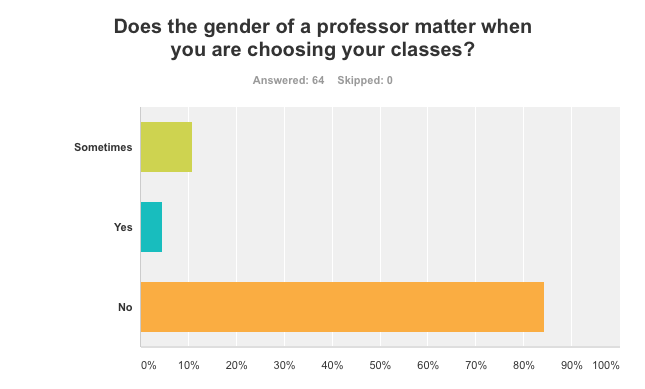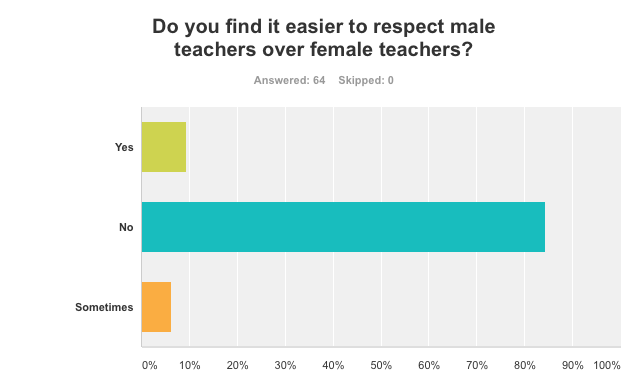Will Richards helped in collecting the data and with the multimedia
A study at a French and US university showed that students when evaluating professors are biased toward their female teachers. As NPR reported, the French students rated the male teacher better across the board although on the final exam those taught by male teachers scored lower. In the American university the experiment was a bit different.
Here, it was the female students, not the males, who rated the instructors they believed to be male more highly across the board. That’s right: The same instructor, with all the same comments, all the same interactions with the class, received higher ratings if he was called Paul than if she was called Paula.
In an attempt to see if WCU students have gender bias towards their instructors we created a non-scientific survey that we distributed on Facebook and in paper. With nearly 75 respondents to an online and in-person survey, over 84 percent of students said that the gender of a professor doesn’t matter when registering for classes and it doesn’t affect students’ ability to respect the professor in any way. Nearly 52 percent of students said that they don’t get more positive vibes from male or female teachers – it’s all about the same.
In our study over half of the responses explain that gender does not determine competence when it comes to providing a quality education, and the level of respect that is given to teachers/professors has nothing to do with their gender at all, but rather how passionate they are about the subject matter that they are teaching.

Student survey response, survey created by Kayla Brookshire
“I honestly have not noticed a difference between male and female teachers. The one aspect that stands out to me the most about all professors is their level of passion and interest in the material that they are teaching. I have consistently found that male and female professors tend to be equally enthusiastic about their work,” explains one of the survey respondents.
While most agreed that the genders are the same in the classroom, there were some suggestions on the not-so-apparent differences that some students have seen throughout their schooling careers.
“I feel like in some situations, teaching styles can greatly differ between male and female professors. Male professors may take a more directive approach, while female professors may be more nurturing,” says one of the respondents, a sophomore at WCU. A few other students responded with answers similar to this.
“I think they offer different perspectives for the students. Female professors can be more open minded and aware of privilege than male professors, which can lead to a more inclusive classroom environment,” agrees an anonymous senior. They also added that while male instructors may assert dominance with more ease than female professors, they have always found the latter deserve respect because of their demeanor and knowledge.

WCU student survey response, survey created by Kayla Brookshire
In contrast with the idea that female teachers are more nurturing and inclusive, some respondents didn’t feel that way at all. Some students explain that female teachers challenge their students more, while male professors are seen as more laid back and accepting.
“I feel like the female professors get pegged as bitchy or snobbish because they have to work against the sexism that arises. They tend to work harder and challenge their students more,” one respondent claimed.
“To me, male teachers are more laid back. They look more comfortable in the classroom, and generally are more forgiving both academically and behaviorally,” said another.
See some more opinions of students in our video below.
Although there may be subtle differences in a male versus female dominated classroom, the data remains the same. Gender of professors doesn’t seem to matter at all to the WCU student population, so why does it matter so much when it comes to their salaries.



